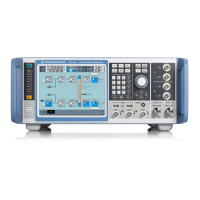Multi-Instrument Setups
R&S
®
SMW200A
607User Manual 1175.6632.02 ─ 16
9 Multi-Instrument Setups
R&S SMW is rarely used as a standalone instrument. Usually, the instrument is con-
nected to a device under test (DUT) or other measurement equipment.
Test setups have different requirements, for example:
●
Test setups comprising two or more devices often require a common reference fre-
quency.
●
Generation of beamforming signals requires phase coherent signals.
●
Some test setups also require control of the signal generation start and an exact
generation start time, for example determined by a defined trigger event.
●
In other cases, you would need time-aligned simultaneous signals within the instru-
ment or possibly also between multiple instruments.
●
MIMO test scenarios can require more than two RF signals, generated by process-
ing the I/Q output signals of the R&S SMW by external instruments like R&S SGT
or R&S SGS.
●
The generation of WLAN 802.11ad signals at 58.3 GHz requires an up-converter
as R&S SZU.
●
Radar echo generation requires connected R&S FSW.
●
etc.
R&S SMW provides several settings that help fulfilling these requirements. This section
explains main principles and gives an overview of the related settings and step-by-step
instructions.
● Synchronizing Instruments....................................................................................607
● Generating Phase-Coherent Signals.................................................................... 607
● Generating Time-Aligned Baseband Signals........................................................ 608
● Control and Operation of External Instruments.....................................................615
9.1 Synchronizing Instruments
For information on the possible scenarios concerning the distribution of reference fre-
quency, test setups and the related settings, see Chapter 7.4, "Reference Oscillator",
on page 441.
9.2 Generating Phase-Coherent Signals
The R&S SMW provides a build-in function that allows a distribution of the local oscilla-
tor signal in a way that multiple RF signals can be derived from the same LO signal.
LO coupling is mandatory for minimizing the phase fluctuations between these RF sig-
nals, as it is for example required for the generation of beamformed signals.
Generating Phase-Coherent Signals

